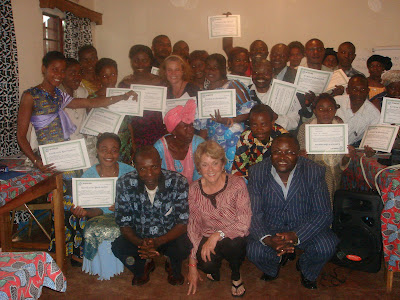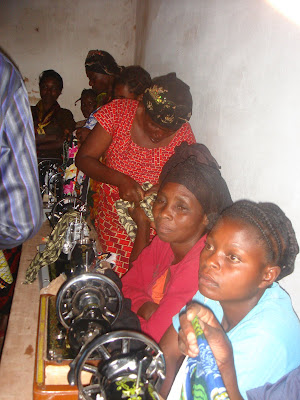 Graduates of our first training with their certificates!
Graduates of our first training with their certificates! The UNICEF sponsored training in Bukavu went very well. Dr. Florimond's materials are excellent, and we were able to speak to the needs of the caregivers present. We were able to communicate our psychological experience so they could apply it to their work.
 Dr. Florimond and his brother Pepa set up the overhead projector.
Dr. Florimond and his brother Pepa set up the overhead projector.
The workshop participants came from two NGOs funded by UNICEF: Panzi Hospital and FSH, a French agency with mostly Congolese workers. (Panzi Hospital is in Bukavu, which is stable right now, while FSH services Minova in northern DRC where random violence and sexual atrocities are ongoing) Our attendees are the people on the ground, the front line who sees the women when they first arrive to seek help.
Education about AIDS/HIV is has permeated the rural areas, so rape victims (men, as well as women and children) know they must receive medical attention within 72 hours. Many walk two days to get help. The ones who cannot walk are carried on stretchers over impassible roads; some die on the way.
What you need to understand about the victims is that before all this happened to them, they were relatively happy people, leading normal lives in their country village. They were married, had children, and lived their lives in the village where they were born. Some had businesses and their children attended school. Many were young girls just beginning life; some were engaged, some too young to be wooed.
The rapes are carried out systematically with the intention of humiliating the woman: gang rape in front of her husband and children, and the other villagers. Sometimes she is maimed by machete, or shot with a pistol in the vagina. Young boys are forced to have sex with their mother or sister, or be killed. Babies are slaughtered in front of their parents; husbands are murdered, and whatever possessions the family has are confiscated.
The women are made to carry the stolen goods on their backs into the bush, where the men keep them as sex slaves until they are able to escape; or until they are so physically damaged the men don’t want them anymore. Some are trafficked for money, as was one girl who was sold to a chief who wanted a pretty young wife. Others have been captured and taken into the bush 2 and 3 times while trying to return to return to their village.
For reasons beyond western comprehension,
the victim is blamed for the dishonor and more often than not, rejected by her husband and the entire community. She is driven from the village in shame with her children, who are now also dishonored. Her husband takes another wife. All her possessions are taken from her; she is penniless without means of support. The secondary trauma of rejection by her husband and village can be as painful and more difficult to resolve than the sexual violation. And a woman without a husband in Congo has no status; it is unthinkable to be unmarried.
I know this is tough stuff for westerners to swallow, and I congratulate you if you’re still reading. What happens here in Congo is so distressing we don’t want to hear about it. We don’t want to know these things happen in our world, so it is easier to turn a deaf ear, switch on the TV, and forget about it. After all, they are just natives in Africa and that’s what they do there, so let them solve their own problems.
 A psychologist at Panzi Hospital, the woman on far left is an excellent clinician.
A psychologist at Panzi Hospital, the woman on far left is an excellent clinician.
But
our attendees --nurses, psychologists, and social workers-- have chosen to help these people, and they listen to their stories every day. They do the best they can. One psychologist took an 11-year old girl home and raised her. A social worker offered a bereft man a sheep and a goat. Another admitted they told the women that what had happened to them wasn’t that bad; there are worse things. Like what I wonder?
In reality, these are the worst trauma cases in the world today. In typical Congolese fashion, these caregivers minimize the women’s suffering and the difficulty of their own job. They want to “fix” things for the victims, but they cannot. It is painful for them to hear the women’s anger, the unjustness of it all, and not be able to make life easier for them. They have a tough job. As requested, we spent the last day of the workshop on burn-out.
There are also
cultural norms which complicate and contribute to this humanitarian disaster. Bottom line, women have no rights and cannot inherit in Congo, even though they do most of the work. Women do everything in the rural areas; they cook, clean, care for the children, earn the money, and carry heavy loads, while the men sleep late, eat and dress, then go drink beer with the other men all day. I am not exaggerating; everyone agrees this is the case. Things are better in the cities, where women can now eat chicken without offending anyone, but many provincial beliefs and witchcraft still predominate in the country.
 Women carrying heavy sacks of charcoal walk 20 miles for a day's wages . . .
Women carrying heavy sacks of charcoal walk 20 miles for a day's wages . . . . . . while their husbands follow leisurely behind.
. . . while their husbands follow leisurely behind.
Which in practical terms means that if you get angry at your husband and try to make him work or even take out the garbage, he will either beat you or get another woman (usually the latter). So the women stay emotionally and financially dependent on their lazy, spoiled husbands, and even take the blame for being raped. Teaching assertiveness is tricky here, to say the least, and the victims need to be convinced that their misfortune is not their fault. You could say we are starting at ground zero.
Without Dr. Florimond’s understanding of Congolese culture, this workshop would not have gone well. Trying to impart western psychology to these caregivers without understanding their culture would have been like putting a top hat on a penguin—a quaint idea but totally inappropriate. But being both Congolese and American, Dr. Florimond can step forward and point out what cultural beliefs need changing. An advocate of women’s rights and emotional expression, he had the male caregivers, and even some of the women, shaking their heads. In Congolese teaching style, he tells them in no uncertain terms what they are doing wrong and what they should be doing instead. . . and it works.
My contribution is to structure and debrief the role plays and to introduce and supervise the clinical interventions. Dr. Florimond translates my psychological knowledge into concepts the Congolese can use with the women. Luckily, there was a Canadian woman in the workshop who speaks French fluently and translated for me. This gave Dr. Florimond a break, except when he spoke Swahili to make a point and neither of us understood a word. Morag is from Vancouver Island, works for FSH, and loves being on the front lines in Minova. She is passionate about protecting women from abuse having worked many years in rape clinics back home. She is supervising social workers for FSH and wants to give training workshops in the future. We both want to learn Swahili.
 Morag Hill, me, and Dr. Florimond happy after the success of our second day.
Morag Hill, me, and Dr. Florimond happy after the success of our second day.
The situation in Congo takes time to digest and is best taken in small doses. What surprises me most about this country is the people: they are the friendliest, warmest people I have ever met. They smile and shake your hand on the street, just to say hello. The Congolese laugh and joke all the time; they have fun with each other. And their music sets the standard for all Africa: the Congolese rumba (souskous) may be the best dance music in the world. Yet, unspeakable crimes against women occur every day, and an estimated 38,000 people, mostly women and children, continue to die every month from starvation, disease, and neglect.
Truly, Congo is a land of contrast and contradiction: a country of enormous wealth with no roads, starvation in the midst of bounty, appalling cruelty combined with genuine warmth, as enigmatic today as it was when Stanley sought the source of the Nile.
 Main street in Bukavu
Main street in Bukavu
With love and gratitude,

 Cristall holding Pepe.
Cristall holding Pepe. Yves in front of women lined up along the wall with their machines.
Yves in front of women lined up along the wall with their machines. Pepe still isn't too sure about me.
Pepe still isn't too sure about me. Natalie crochets while other women sew.
Natalie crochets while other women sew.
 Morag and I both wearing libayas. This one was my thank -you gift from Yves.
Morag and I both wearing libayas. This one was my thank -you gift from Yves.
 Wilo with "Lisa", the electric edger for making men's shirts.
Wilo with "Lisa", the electric edger for making men's shirts. Wilo standing in front of the new Women's Center on a sunnier day.
Wilo standing in front of the new Women's Center on a sunnier day.



 Wilo inspects the Butterfly.
Wilo inspects the Butterfly.
















.JPG)

 Dr. Florimond and his brother Pepa set up the overhead projector.
Dr. Florimond and his brother Pepa set up the overhead projector.


 Morag Hill, me, and Dr. Florimond happy after the success of our second day.
Morag Hill, me, and Dr. Florimond happy after the success of our second day.









